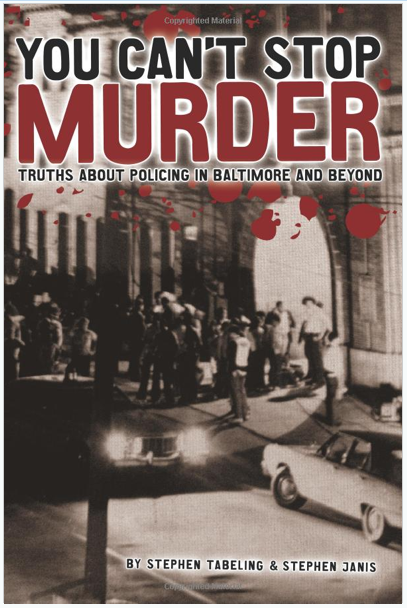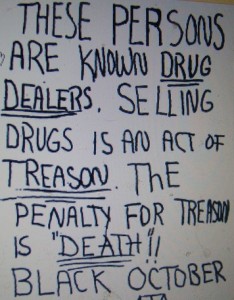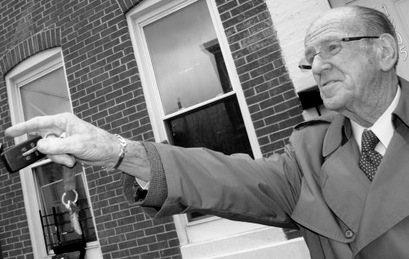
Stephen Tabeling’s memoir, You Can’t Stop Murder, was co-written by WBFF Fox45-TV’s Stephen Janis & published by Baltimore True Crime, in association with Voice of Baltimore.
IS STILL A COP, GIVING INSIGHT AND ADVICE;
CO-WRITTEN BY TV INVESTIGATIVE PRODUCER
Published by Balto. True Crime, Stephen Janis co-authored;
in association with — and edited by — VoiceOfBaltimore.org
TO BE FEATURED SATURDAY AT BOOK FEST IN MT. VERNON
By Alan Z. Forman
The book is titled You Can’t Stop Murder: Truths About Policing in Baltimore and Beyond. It’s a page-turner.
But it isn’t fiction; its truths are even stranger.
For long before TV’s “Homicide” and “The Wire” made their mark on television viewers, casting the City of Baltimore in the role of Murder Capital of the World, Detective Stephen Tabeling was investigating crime in Charm City, most notably the all but forgotten assassination attempt on former Mayor William Donald Schaefer and the random shooting of seven cops by a jilted Westside teenager.
The attempt on Schaefer occurred in April 1976, less than a week before an 18-year-old gunman in West Baltimore opened fire and shot seven police officers, killing one, all because his girlfriend dumped him and he was despondent over it.
In just four days, beginning April 12th and ending on the 16th, a Baltimore city councilman and a police officer were murdered on Tabeling’s watch, in the early years of his tenure as a detective in the Baltimore Police Department. In addition to the two dead men, eight others were shot as well, including a secretary/typist at City Hall.
Schaefer, who was in Annapolis at the time, was not directly threatened, despite being the target of the disgruntled gunman’s wrath. But another city councilman — the grandfather of current Maryland First Lady, District Court Judge Catherine “Katie” O’Malley — suffered a heart attack during the melee, that took his life less than a year down the line.
Tabeling has just completed a book — published by Baltimore True Crime, in association with Voice of Baltimore — chronicling these and other events of his long career in law enforcement, including the 1973 murder of a drug-dealing Maryland state delegate in a midtown parking garage.
He solved that crime but ran afoul of a major civil rights leader of the day, who turned the trial into a racial vendetta against Tabeling and the Baltimore City Police, resulting in the murderer’s stunning acquittal.
At age 84, Tabeling still teaches cops to understand and apply the law when making arrests. He is appalled at the lack of legal knowledge most arresting officers possess, and is famous for having always told his subordinates, including students at the Police Academy, where he teaches to this day, “Get a warrant, get a warrant, get a warrant!”
WILL MEET WITH MAYOR’S SENIOR AIDE
Within the week he will be meeting with one of Mayor Stephanie Rawlings-Blake’s senior aides to discuss ways to improve policing in the city.

Flyer left at scene of grisly 1973 killing of Maryland State Delegate James ‘Turk’ Scott, a murder case in which Lt. Tabeling ran afoul of celebrated civil rights activist Vernon Dobson. A shadowy group named ‘Black October’ claimed responsibility for the early morning shooting.
“The mayor’s deputy has invited me to City Hall this week to discuss ways to improve the situation.”
Despite being long “retired” he still gets up at the crack of dawn and dresses every day for work, he said, apologizing to VoB for returning an email message by phone several minutes after 8 a.m. on a weekend — the “habits of a lifetime,” he explained. Voice of Baltimore has never seen Tabeling dressed in anything but a suit and tie.
Even at age 84 he looks ready to go out on the street and investigate a crime or murder.
He wrote the book, titled You Can’t Stop Murder: Truths About Policing in Baltimore and Beyond, with Janis as co-author, “to preserve the history of the cases” that he worked, “with the hope it can inform the present,” he explained.
“To argue forcefully through the lessons of the past that policing is a preoccupation that merits fierce debate and constant rethinking. To continue a fight to maintain the purpose and integrity of the law so that future generations might enjoy its benefits unimpeded.”
‘TO REVEL IN THE POTENCY OF THE LAW’
But the “major reason” he wrote the book, he said, is “to revel in the potency of the law. Not as a blunt instrument for incarcerating poor people, but as a means of maintaining a civil society through good policing. Not as a bludgeon for the civil rights-averse drug warriors, but as a tool to deter bad behavior and remove bad actors from the community.
“Because in the trenches of one of the most violent cities in the country,” he maintains, “it’s all you’ve got. When a vigilante group is meting out street justice, the law is what keeps cops from confronting vengeance with indiscriminate violence. When a city awash in drugs tries to fight back, the law ensures police actually weed out the bad apples while keeping the community intact.”
He goes on in the book to discuss his ups and downs with the Baltimore Police Department — he was alternately the golden boy and scapegoat of Police Commissioner Donald Pomerleau back in the day — and so he’s also “looked in the mirror,” he says, “turning the spotlight on myself, questioning my own beliefs to reexamine the whole idea of what it means to be a cop.”
One of those things involves an understanding and appreciation of the U.S. Constitution, he says. Most cops lack that knowledge, he declares emphatically, allowing countless numbers of criminals to go free because arrest evidence is too often tainted by police ignorance.
Some of the best parts of the book involve his altercations with the former commissioner, who Tabeling says often “screamed at the top of his lungs at me,” then gave him plum assignments.
“For want of a better term,” he concludes, “I would call this ‘The Book of Cop,’ the ugly liturgy of policing, a compilation of meager truths and bitter pills, some swallowed, some not.
“The Book of Cop.”
alforman@voiceofbaltimore.org

Retired Baltimore City Homicide Detective Stephen Tabeling, co-author of newly published memoir You Can’t Stop Murder, will appear with collaborator Stephen Janis at the 2013 Baltimore Book Festival in Mount Vernon Saturday at 1:30 p.m.
EDITOR’S NOTE: Stephen Tabel- ing has been a police officer for more than six decades, nearly half that time in Baltimore City alone, where he received 48 Commendations and six Bronze Stars for investigative work above and beyond the call of duty, retiring as a lieutenant. He began his career with the Baltimore Police Department in 1952.
In the year 2000, at age 71, Tabeling was called back by the BPD to provide an analysis of its Homicide Squad, followed by nine years of recruit training for new police officers as well as in- service training for the depart- ment’s veterans.
This Saturday, at 1:30 p.m., he and Janis will offer insights on “Crime Writing After ‘The Wire’” at the 2013 Baltimore Book Festival, as a panel of writers discuss chronicling real-life crime and how their subject matter has changed in light of The Wire, which Entertainment Weekly recently named the No. 1 TV show of all time.
Joining them will be retired police officer Dick Ellwood, who worked for Tabeling and has written a book of anecdotes from his years on the Baltimore police force, and Ken Lang, a former homicide detective and award-winning author of several true-crime books.
Ellwood is famous for claiming to have once arrested baseball legend Mickey Mantle. In addition to his 2010 book of anecdotes, he has written a crime novel and is currently working on a children’s book.
Janis and Tabeling’s “Book of Cop,” You Can’t Stop Murder — published by Baltimore True Crime, in association with Voice of Baltimore — was edited by VoB Managing Editor AL Forman and co-edited by Taya M. Graham, with assistance from former Baltimore Sun editor and rewrite man David M. Ettlin. It may be purchased from Amazon at http://www.amazon.com/You-Cant-Stop-Murder-Baltimore/dp/1491009772.
Excerpts on VoB may be found under the title, Black October and the Murder of Turk Scott by clicking here, here and here.






September 30th, 2013 - 5:01 AM
[…] Read More at: Voice of Baltimore […]
October 26th, 2013 - 10:35 PM
[…] in addition to Detective Tabeling — whose biography is included in previous VoB entries (click here) — include Sujata Massey, former Baltimore Evening Sun reporter and author of 11 mystery and […]